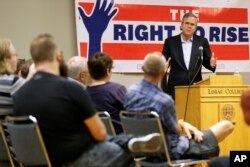Former Texas Governor Rick Perry declared Thursday that he would make a second try for the White House in 2016, becoming the 10th Republican to officially declare a bid for the presidency this year.
The crowded field has no clear front-runner. Former Florida Governor Jeb Bush is expected to officially join the race June 15.
Surrounded by family and supporters, Perry announced his candidacy in his home state, in the Dallas suburb of Addison. He focused much of his statement on what he believes are the foreign policy failings of President Barack Obama, including the withdrawal of U.S. forces from Iraq and the rise of the Islamic State group.
On Iraq, Perry said, “No decision has done more harm than the president’s decision to withdraw our troops from Iraq.” Like many of his fellow Republican contenders, Perry vowed a more muscular foreign policy if elected next year. “We don’t have to settle for a world in chaos or an America that shrinks from its responsibilities. We don’t have to apologize for American exceptionalism or Western values,” he said.
Perry said he was running to “end an era of failed leadership.” Memories, however, are still fresh of his implosion during the 2012 Republican primaries and his infamous “oops” moment during a debate when he could not remember one of three Cabinet departments he had pledged to eliminate.
Lots of competition
Perry is the latest of several Republicans to join the 2016 race in recent days. South Carolina Senator Lindsey Graham announced his candidacy this week and said his focus would also be on foreign policy and the struggle against Islamic State militants in particular. “I want to be president to defeat the enemies that are trying to kill us — not just penalize them or criticize them or contain them, but defeat them!” he said.
Graham’s announcement came shortly after declarations from former Pennsylvania Senator Rick Santorum and former New York Governor George Pataki. Santorum narrowly won the Iowa caucuses vote over Mitt Romney in 2012 and hopes to energize social conservatives again next year, although he will have plenty of competition from other conservative contenders.
Bush, who has been traveling the country and raising millions of dollars for his political action committee, has come under pressure of late to formally announce his candidacy.
When pressed about the matter recently on the CBS program "Face the Nation," he said, “I’m nearing the end of this journey of traveling and listening to people, garnering and trying to get a sense of whether my candidacy would be viable or not.”
University of Virginia analyst Larry Sabato said the Republican presidential field remains wide open.
“The three at the top are Jeb Bush, [Florida Senator] Marco Rubio and [Wisconsin Governor] Scott Walker," he said. "That is a very tentative listing because this is a fluid situation, and there is a long campaign and hundreds of millions of dollars to be spent just to get the nomination.”
Another Democratic challenger
The battle for the Democratic Party nomination has also become more crowded with the announcement that former Rhode Island Governor Lincoln Chafee has entered the race. He becomes the third challenger to front-runner Hillary Clinton, the former secretary of state and New York senator.
Chafee won election to the Senate and his governor’s race as a Republican, but in recent years he switched to the Democratic Party. While in the Senate, Chafee was the only Republican to oppose the war in Iraq, and he cited Clinton’s vote in favor of the Iraq war authorization as a major reason he was running.
Chafee began his campaign with some unusual policy ideas, including a call for the U.S. to switch to the metric system and a refusal to rule out negotiations with the Islamic State group. “Wwithout a doubt, we have prodigious repair work to do in the Middle East and North Africa," he said. "We have to change our thinking. We have to find a way to wage peace.”
Chafee joined Vermont Senator Bernie Sanders and former Maryland Governor Martin O’Malley as challengers to Clinton. O’Malley began his long-shot campaign in Baltimore, where he once served as mayor: “The story of our country’s best days is not found in a history book, because this generation of Americans is about to write it!”
Clinton’s approval ratings have dipped of late because of controversies involving her use of a private email account while secretary of state and the fundraising practices of the Clinton Foundation, a nonprofit established by her husband, former President Bill Clinton.
Analysts, however, believe that Clinton remains a strong favorite. “What she does run on is having great experience, great support from the party, great support from all of the leaders, all of the fundraisers, and that is a very strong position to begin from,” said John Fortier of the Bipartisan Policy Center in Washington.
More announcements could come this month in addition to that of Bush. Louisiana Governor Bobby Jindal and Walker are both expected to announce their intentions by the end of June. New Jersey Governor Chris Christie and Ohio Governor John Kasich could also join the field at a later date.







